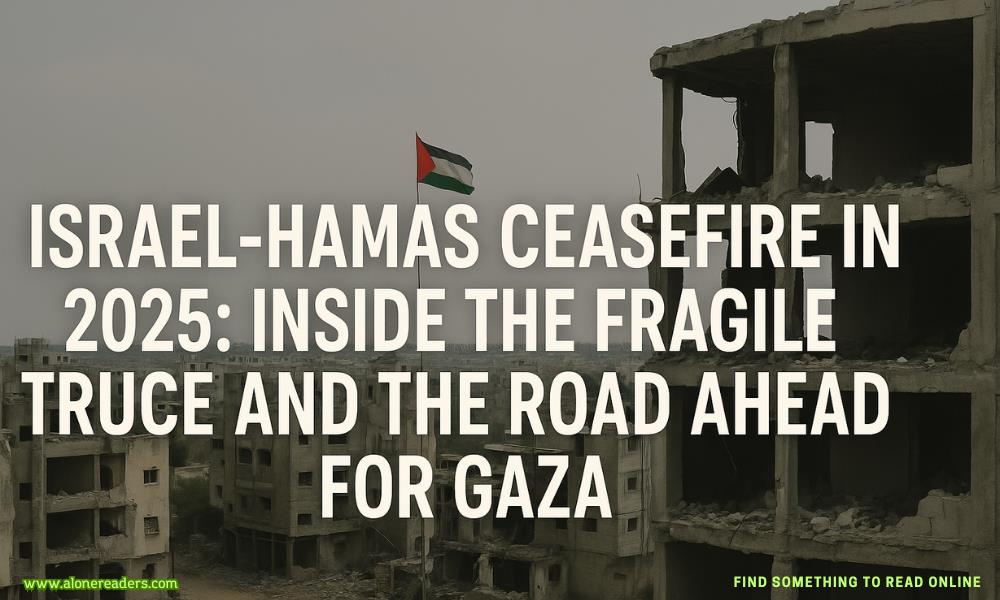Page 12 of Sergeant's Christmas Siege
“That’s why I’m a trooper, Ms. Scott,” Kate repeated, and something seemed to pass between them then, woman to woman on an already too-dark December afternoon. “I can tell the difference between weather and major crimes.”
They went around and around a few more times, but after that moment of telling honesty, Caradine seemed to fall into her scowl with a vengeance and stay there. Kate thanked her for her time, shot off a note to one of her friends in the department to pull up information on one Caradine Scott, currently of Grizzly Harbor though clearlyfrom the Lower 48 originally, and smiled as she let herself out.
Night had come down, hard. It was after four p.m., and it could as easily have been four in the morning. And Kate didn’t have to go check her instruments or check the flight databases, because she could see how bad the fog was with her own eyes. It was a heavy curtain in and around everything, making the dark thicker. As if December had teeth and weight.
Kate had always thought so.
And Kate was more than capable of flying by her instruments, but she didn’t like to risk it when the weather got questionable. She wasn’t much for taking risks, full stop. There were too many stories of small crafts like hers going down in weather like this because the pilot had depended too much on the instruments and run straight into the side of a mountain.
That was the thing with mountains, especially here. They were wily. And not always where they were supposed to be.
It looked like she’d be spending the night in Grizzly Harbor.
She tucked her hands into her jacket, grateful that the village was on the water, making the temperature more reasonable than the winters she remembered off in the interior of the state, out there in the frigid, subzero bush. She’d seen snow on the mountains here as she’d flown in, but there was none on the ground. Then again, it was early yet. She’d expect any serious snow to set in after the New Year.
Even in the foggy afternoon, Grizzly Harbor was pretty. The buildings were clustered together, lit up against the pressing night and the creeping fog. Lights punched out into the dark, some of them brightly colored to announce the coming holiday, others there to make sure the residents could find their way. But either way, it felt festivetoday. Or at least, that cross section of festive and functional that was an Alaskan winter.
The wooden pathway that took the place of a street was easy enough to navigate from light to light. Kate followed it all the way down to the docks at the bottom of the hill, where she’d left her seaplane. She called in her position and her plans, shared a few of her observations, then retrieved the go bag she kept in her little plane. Because getting stranded out on a job was par for the course, and troopers always came prepared.
Kate slung her bag over her shoulder and settled it against her hip, but when she went to start the steep walk back up the hill toward the inn she’d seen earlier, she paused.
Because Grizzly Harbor clung to the side of the mountain, covered in fog but gleaming like a Christmas card. The weathered houses were clustered together, as if huddling for warmth. In the weak daylight earlier, Kate had noticed how ramshackle they were. How rugged.
But night and fog were kinder, softening all the edges, and Kate’s breath left her in a rush.
Once again, she blamed the time of year.
This was always when she was at her weakest. And weakness led to outrageous reactions, like the outsized one she’d had to Templeton Cross. She flushed again, here in the dark, where at least this time no one could see her betray herself so thoroughly. She told herself it was temper, but she could feel that heat all over her body. Even in places she’d decided long ago didn’t work for her the way they did for others. She was hot. Everywhere.
It was him. Templeton Cross.
That too big, too loud, too deliberately inappropriate man who was very likely a criminal... got to her. He made her body behave like it belonged to someone else. Someone significantly less disciplined than Kate.
Someone who would actually consider a man on thewrong side of the law, which was so decidedlynot herthat something like a sob welled up deep inside Kate, as though her body was trying to rebel against the things it felt.
“It’s just Christmas,” Kate muttered out loud to herself. To the fog. To whatever was happening inside her. “All you have to do is get through it.”
She forced herself to stop gaping at the pretty village posed there before her like her very own Christmas carol, complete with the musical accompaniment from the rising tide at the water’s edge. She started walking up the hill, wishing there were some way she could stop feeling that terrible hollowness that always marked this time of year for her.
She would have been perfectly happy to stay numb. To feel nothing at all, the way she did the rest of the year.
People loved to talk about the power of family. And they never seemed to talk about it more than when Christmas approached, as if the presence of an Advent calendar made them forget what world they lived in. As if hokey songs and a fat man in a red suit erased all the terrible things that went on all around them, all the time.
Kate hadn’t grown up with Christmas. Not the way people talked about it, anyway. There had been no tree, decorated or otherwise. Certainly no gifts. Her father—a term Kate only used because it was biologically correct—had never trucked with any notion of holidays. Christmas was a workday like any other out there in the family compound, where their version of off-the-grid subsistence living in the frigid bush came with a whole lot of daily hard labor, regardless of the lack of daylight. And on Christmas, that workload came with an extra helping of unhinged ranting.
What Kate knew about Christmas she’d learned from her father’s bitter rants against capitalism, materialism, commercialization, and the sick and bloated masses who were too stupid to see the truth that had led him and hisbrothers away from all that corruption to make their own world as they liked it.
When she’d finally escaped that tangled mess, it had been under cover of the darkness that characterized this time of year. On a subzero Christmas Day up north. Before that day fifteen years ago, Christmas had always been the horror of what her father would do and how long he would make them all sit there, cold and hungry, while he screamed and yelled and carried on about a world none of the kids growing up in the compound could remember. Then it had been the longest day of her life, when she’d escaped all of that. And then, later, it had been the difference between what Kate knew Christmas was and what everyone out there in the so-called real world claimed it was while manic and overtly cheerful.
It all led to that hollowness inside her, which made her suspect that her childhood had broken something crucial within her. And that she would always be an alien, unable to feel the things normal humans did. Especially where family was concerned.
Her solution had always been to work. Everyone else wanted the holidays off, but not Kate. Never Kate. It was one of the reasons, she was sure, that she’d advanced as quickly as she had through the ranks.
And so she had no idea why, despite all of that, she still found herself susceptible to colored lights strung up on an evergreen tree. Candles and lanterns lighting up windows. And houses lit up against the smothering Alaskan night.
She headed up the hill, making it to the wooden pathway that led toward the inn. She heard the sound of a door slamming in the distance. A dog barking. The hum of generators. The sea in the distance, surging against the rocks.
And the sudden, bright splash of music and laughter when the door to the local bar swung open, spilling noise out into the street.
- Daddy's Accidental Babies by Sofia T. Summers
- Death by Michelle Heard
- Feral by Jenika Snow
- Quadruplets for the Vipers by Tia Quinn
- Beautiful Sinner by Ivy Davis
- Ride Me Cowboy by Clare Connelly
- Bound in Matrimony by Emma Bray
- Calla's Boys by Yolanda Olson
- Property of Anchor by Winter Travers
- Punish Me, Daddy by Sara Fields
- His Mark by Sara Fields
- Filthy and Fierce by Hope Ford
- Vow of Obsession by Lucy Darling
- Veiled Vengeance by Ivy King
- Don't Say You're Sorry by Bethany Winters
- Kingston by Terri Anne Browning







